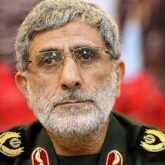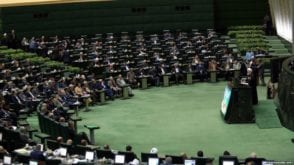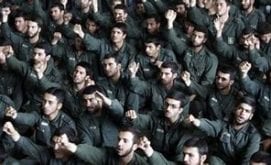Iranwire – On the 45th International Labor Day since the 1979 Islamic Revolution, the Council of Labor Protests issued a statement highlighting the ongoing violation of the rights of Iranians.
The statement outlined demands that have been perennially ignored by the Islamic Republic.
Notably, this declaration came exactly one week after remarks by Ali Khamenei, Iran’s Supreme Leader, wherein he hailed workers as “the frontline in the battle against America” during a meeting.
Despite such rhetoric, workers and government employees have persistently voiced grievances of injustice, staging protests and strikes in recent months and years.
Among them are employees from various sectors, including the oil and petrochemical industries, who have taken to the streets in recent weeks.
Judicial documents obtained by IranWire reveal that individuals implicated in significant economic corruption within these industries have evaded justice, benefiting from government patronage and remaining at large despite legal convictions.
Their exact involvement in the ongoing oppression of workers remains unclear.
“Today, the lives of workers and precarious laborers are marred by a relentless struggle against poverty and destitution. They face barriers to accessing essential services such as healthcare, education, and recreational facilities,” said the Council for Organizing Protests of Oil Contractual Workers, in collaboration with eight unions, associations, and labor councils, in a statement on the occasion of International Labor Day.
“Disabled individuals are particularly neglected, lacking a fixed income or adequate support, despite deserving monthly allowances and access to necessary equipment free of charge,” the statement underlined.
It added, “Women endure pervasive discrimination, battling against societal norms that consume their lives and subject them to constant fear and uncertainty.”
The statement comes at a time when domestic media reports indicate a tripling of the per capita poverty line over the past three years, with a rising number of formerly non-poor individuals now falling below the poverty line.
Additionally, another report forecasts no foreseeable improvement in people’s welfare this year.
In April of this year, the chairman of the labor council at the Isfahan Poly Acrylic factory and a representative of the factory’s workers revealed that at least two thousand workers had lost their jobs. He said that the jobs were lost due to government ministers’ erroneous decisions, particularly under Ebrahim Raisi’s administration, coupled with the increase in the base price of petrochemical products.
Moreover, the government’s failure to pay the workers’ salaries, including those of Negin Makran’s petrochemical workers, has further fueled their discontent.
The dissatisfaction among workers regarding their living conditions is palpable.
According to a report by Etemad newspaper last year, the minimum daily wage for laborers has plummeted to 177 thousand tomans ($3), barely enough for a fried potato dish or onions, and sometimes just a falafel sandwich.
In the face of these systemic issues, documents obtained by IranWire reveal how Iran’s judiciary has misled public opinion and shielded economic wrongdoers in the oil and petrochemical sectors through ostensible anti-corruption trials.
Meanwhile, instead of tackling economic corruption head-on, the same judicial system has redirected its focus towards environmental activists and defenders.
In June 2023, on the side of a press conference held by a petrochemical investor in Miankaleh, four environmental activists were arrested and subjected to interrogation, underscoring the skewed priorities of the justice system.
When Officials’ Children are on Field
Before the 2010s, the “Crescent” case was among the few politically charged judicial affairs related to oil that resonated widely.
This case involved an agreement to export 500 million cubic feet of gas from the Salman field to the United Arab Emirates.
However, in 2005, upon Mahmoud Ahmadinejad’s ascent to power, opposition arose against implementing this contract.
Eventually, under pressure from Keyhan newspaper and the parliament, this one-sided agreement was annulled.
The Ahmadinejad administration, coupled with the sanctions he referred to as mere “paperwork,” gave rise to a cadre of corrupt individuals who circumvented sanctions and amassed substantial wealth through unconventional oil sales.
Among them was Babak Zanjani, who in 2012 ranked as the wealthiest Iranian globally but was later sentenced to death for “disrupting the economic system.”
On April 30, the judiciary’s news agency reported Zanjani’s amnesty from execution, with his sentence commuted to 20 years’ imprisonment.
Just a day before this development, Gholamali Jafarzadeh, a parliament member, disclosed that nine percent of oil sales to China would be allocated to the “Aghazadehs,” referring to the children of officials and people close to the Islamic Republic’s establishment.
However, he lamented, “We are not even selling oil now, unfortunately. But at this rate, selling oil feels akin to auctioning off stolen property.”
Oil Rig Was Lost, No One Was Convicted
Iran’s economy is often referred to as the “oil economy,” as oil is the country’s primary revenue source.
Yet economic corruption appears particularly conspicuous within this sector. Compared to other economic spheres, instances of rent-seeking and the evasion of fair legal proceedings among oil corruptors are notably prevalent.
Among all cases of embezzlement and corruption in the oil industry, the saga of “the missing rig” remains etched in the collective memory of Iranians.
This rig, costing tens of millions of dollars, was never delivered to the government, marking a significant episode during Mahmoud Ahmadinejad’s presidency.
This narrative harkens back to corruption allegations surrounding the purchase of a marine oil rig from an Argentinian company in 1984, for which Iran paid $87 million but never received the equipment.
Instead, the funds were deposited into the accounts of three individuals.
The issue resurfaced in 2015 when Bijan Namdar Zanganeh, then Minister of Oil, disclosed it. He claimed that the Ministry had initiated investigations leading to the opening of a case regarding the missing rig and the ensuing corruption.
This brought attention to Ali Taheri Motlaq, the CEO of Marine Facilities Company at the time of the contract signing, who was appointed on the recommendation of Masoud Mirkazemi, the oil minister during Ahmadinejad’s presidency.
Following Zanganeh’s revelations, Taheri Motlaq named individuals allegedly involved in the contract formation in an interview with the Jumhouri-e-Islami newspaper. However, the identities of the individuals were abbreviated.
According to documents obtained by IranWire, Taheri Motlaq was arrested six months after the March 2016 interview in connection with the missing rig case.
However, he was released eight days later.
Charges against him included acquiring money illegally, breach of trust, money laundering, and misuse of company assets and credit against its interests.
Khamoshi: Uncles of Khamenei’s Son’s Wife
IranWire documents reveal that the judiciary, led by Gholam-Hossein Mohseni-Eje’i, the then-deputy of the judiciary at the time, obstructed the filing of a case regarding the corruption involving the Khamoshi family in the Petrochemical affair.
The Khamoshis are the uncles of the wife of Meysam Khamenei, the son of the Supreme Leader of the Islamic Republic.
Previously, IranWire extensively examined the corruption case within the Iran Petrochemical Trading Company, famously dubbed “Petrochemical Gate.”
This scandal involved corruption totaling six and a half billion euros, implicating institutions such as the Ministry of Intelligence and Khatam-ul-Anbia’s camp of the IRGC.
The Khamoshi family comprises six brothers, most notably Ali Naghi, who has been dubbed the “godfather of Iran’s petrochemicals.”
Ali Naghi Khamoshi served as the head of Iran’s Chamber of Commerce for 27 years, effectively acting as the private sector’s parliamentarian.
He held a seat on the Financial and Credit Council of the Central Bank of Iran for the same duration.
Additionally, he headed the Mustafafan Foundation of the Islamic Revolution from 1979 to 1981 and was a founding member of the Islamic Motalefeh hardline party. Ali Naghi also represented Tehran in the fourth term of parliament.
In 2006, he established the Iran Investment Company in accordance with Article 44 of the Constitution and directives from the Supreme Leader.
The economic corruption case involving the Iran Petrochemical Trading Company was investigated in the Special Judicial Complex for Combating Economic Corruption, resulting in a 2,000-page verdict.
Despite the defendants’ confessions implicating the Khamoshi brothers and intervention from Gholam-Hossein Mohseni-Eje’i, these individuals remained shielded from charges.
Remarkably, following the conclusion of the Iran Petrochemical Trading Company case, Judge Asadollah Masoudi Maqam was removed from his position, and information regarding his subsequent activities is scarce.
Najafis: From Bribes to Judge Mansouri, Ties with Basti Hills Owners
The Najafi brothers found themselves embroiled in the Bakhtar Petrochemical and Shahrak Kalak cases during investigations into Akbar Tabari, the former deputy of the judiciary.
Akbar Tabari served as the executive deputy of the judiciary during Sadegh Amoli Larijani’s tenure in the judiciary.
He faced charges of orchestrating a bribery network, money laundering, document forgery, and influencing judicial cases, leading to his arrest and trial.
Hassan Najafi, a secondary defendant in the same case, evaded arrest during Tabari’s trial.
He stands accused of involvement in a bribery network, bribing Akbar Tabari, and paying 500 thousand euros to Gholamreza Mansouri, the former executive judge of Lavasan in northern Tehran.
Mansouri was infamous for violating journalists’ rights and faced accusations of torture before his suspicious death in Romania in July 2019. The circumstances of his death continue to raise doubts, even though it was officially declared suicide.
Furthermore, the Najafi brothers are kin to the Motahari Asl family, owners of the Basti Hills township.
Hassan Najafi is the nephew of Mahmoud Najafi, who is also related to Gholamhossein Motahari Asl. Both families wield significant influence in the petrochemical industry.
Gholamhossein Motahari holds substantial shares in Amir Kabir Petrochemical and Zagores Petrochemical, alongside ownership of Navid Zar Shimi, Saderfar, Bahar Gharb, and shares in Poshineh Chemical and numerous other petrochemical companies, valued at around $1.5 billion.
Mahmoud Najafi also owns Farsashimi Petrochemical, where he is listed as CEO on the company’s website.
Despite evidence gathered by independent judges and documented by IranWire, the judiciary has failed to initiate legal action against the Najafi family, resulting in no convictions.
Their alleged transgressions extend beyond the Akbar Tabari case, with corruption allegations surfacing within the Bakhtar Petrochemical Group.
The special inspector of the National Inspection Organization highlighted concerns about the Bakhtar Petrochemical case, urging legal action and judicial review regarding share transfers.
These transfers saw the Najafi brothers’ share rise to 45.45 percent, prompting the referral of a criminal case involving 11 government officials and private individuals to the Tehran Prosecutor’s Office, which remains pending.
Expanding Oil Corruption
Corruption within the oil and petrochemical sector extends beyond the Khamoshi and Najafi brothers or the aristocrats profiting from circumventing sanctions.
Amidst the Woman, Life, Freedom movement, an overlooked story pertains to the corruption scandal involving Mehr Petrochemical.
In September 2022, news agencies reported that Mehr Petrochemical’s corruption would hamper production, potentially reducing gas condensate extraction from the South Pars gas field and exacerbating urban and industrial fuel and energy supply crises as winter approached.
The violations at Mehr Petrochemical were exposed following an investigation by the National Inspection Organization, leading to the dismissal of CEO Abdullah Moghadam, who had close ties to Ebrahim Raisi.
Last month, another corruption case surfaced in Iran’s petrochemical sector: the embezzlement of two million dollars at Imam Port, with the defendant fleeing to Canada.
Iranian media quoted Abu Talib Gerayloo, Director General of Ports in Khuzestan province, acknowledging the financial misconduct.
However, despite official statements, an accounting employee at one of the petrochemical companies in Imam Port received a substantial sum in digital currency from abroad and fled to Canada with his family.
Examining these incidents reveals a stark contrast in the judiciary’s treatment of CEOs of large economic entities versus workers, whose lives grow increasingly precarious under the policies of the Islamic Republic.
On International Labor Day, workers find themselves either protesting or imprisoned, while their employers evade accountability, their whereabouts unknown on a global scale.
 Shabtabnews In this dark night, I have lost my way – Arise from a corner, oh you the star of guidance.
Shabtabnews In this dark night, I have lost my way – Arise from a corner, oh you the star of guidance.



